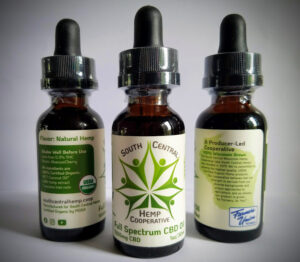CBD oil is becoming more and more popular as people learn about it. But with all of the different options in the CBD industry, it can be hard to know which one is right for you. In this blog post, we’ll discuss the different types of CBD oil. We’ll also give some guidance to help you choose the right type of CBD products for your specific needs!
Commonly used CBD oil terms
Terms can sometimes be confusing and searching for a specific product can be even more difficult. Before we jump right into all things CBD, let’s start with some common terminology in the industry. Knowing the terminology will help you in your search for information and different types of CBD products you’re interested in:
CBD:
Also known as Cannabidiol, is one of the active ingredients in cannabis. It’s the second most abundant cannabinoid found in the plant after THC. CBD is non-psychoactive, meaning it won’t get you “high.”
THC:
Tetrahydrocannabinol, is the other active ingredient in cannabis. It’s a psychoactive cannabinoid and is the one that gives people the “high” feeling. It’s also the ingredient that is generally being tested for on drug screenings.
Hemp oil:
Is oil derived from the seeds of the hemp plant. Not to be confused with CBD oil, hemp oil is commonly used in cooking applications and doesn’t contain any CBD. It isn’t regulated in the same manner as CBD products and you can likely find it in your local grocery store. To learn more about the difference, check out our article on the difference between CBD and hemp oil.
Cannabis oil:
A general term for both CBD and THC oils. The CBD or THC extraction is added to different carrier oils to make different CBD products.
Full spectrum:
A type of CBD oil that includes all of the cannabinoids, terpenes, and other compounds found in cannabis. This is different from an isolate, which only contains CBD.
Broad spectrum:
CBD oil that contains most of the cannabinoids and other plant compounds found in cannabis, except for THC. Broad spectrum products are a cross between full spectrum and a CBD isolate. So, broad spectrum products would be a good choice for a user that is unsure if they wanted to try a full spectrum CBD product, or an isolate product.
CBD isolate:
CBD isolate is just CBD, it contains only cannabidiol, with no other cannabinoids or plants. It’s considered a more pure CBD form, compared to broad spectrum and full spectrum CBD, which both have additional compounds.
Nano cbd:
This is CBD oil that has been broken down into small particles. It allows for an easier absorption rate of 100%, compared to the 50% absorption of CBD.
Terpenes:
Plant compounds found in cannabis that give the plant its unique smell and flavor. Are important because they can help to increase the potency of CBD.
Vaping:
A method of consuming CBD oil by inhaling it through a vape pen or e-cigarette.
Now that you’re a bit more familiar with some of the CBD terms, let’s go over some general information.
What is CBD oil?

CBD oil is a natural oils that contains Cannabidiol. It can be extracted from different parts of the cannabis plant, including the flowers, stalks, and leaves. CBD oil can also be made from hemp plants. Hemp plants are a type of cannabis plant that contains high levels of CBD and low THC.
Types of CBD
The use of cannabis has grown rapidly, both within the USA and globally. Along with that growth, a wide variety of CBD products in the market have also grown, which can cause confusion for some people. So let’s dive into the characteristics of various CBD types and help clear things up.
CBD Isolate
CBD isolate is a “real CBD oil”, since a single isolate contains only CBD (cannabidiol) and no other plant compounds. It’s suggested for new CBD users to start with an isolate so they can focus on the sole property of the CBD and nothing else.
Broad Spectrum CBD Oil
Broad Spectrum CBD oils provide a balance between isolated and full spectrum CBD oil. This oil contains cannabinoids and plant compounds, but doesn’t contain THC, as most of it’s been removed in order to be considered undetectable.
Full Spectrum CBD oil
CBD oil consists of all the components of its own CBD isolate. We say that because cannabis oil contains CBD and other cannabinoid compounds, such as THC and terpenes, that are naturally found in the hemp plant. Full spectrum CBD can be called full or whole plant extract. The oil is extracted through cannabinoids extraction and filtration and contains terpenes and flavonoids. Despite the cannabinoid extraction, the molecule has not been removed. CBD has THC, but doesn’t have enough THC to make you high. Regulations require this oil to be less than 0.3% THC, but it’s important for users to know that it isn’t removed entirely.
CBD Carriers: oils vs tinctures
It is crucial for you to know what carrier agents can be used for CBD. CBD oil and tinctures have similarities, but have differences too. CBD oil is the extracted product, regardless of how it is extracted. Tinctures are created by adding the oil extract to a carrier agent like coconut oil, MCT or hemp oil that is used to dissolve and dilute the mixture to the targeted potency.
Consuming CBD Products
Many routine CBD users find the versatility in products to be one of the main reasons they love CBD. Most products are taken sublingually, which means placing a few drops under your tongue and holding it there for 30-60 seconds before swallowing. Different products can have different effects, so it’s important to know how products are used so you can figure out which product best fits your needs. Here’s a list of different ways of taking CBD.
CBD Edibles:
CBD can be infused in different types of food and eaten. CBD gummies are a popular type of edible, but other forms such as CBD chocolate or baked goods are also available.
CBD Capsules and Pills:
For users who don’t like the taste of either oil or tincture, capsules and pills are a great alternative. They can help users avoid the unpleasant taste, while delivering the same potency and results as oils or tinctures.
CBD Oils:
CBD oils are one of the most popular ways to take CBD, as they’re fast-acting and easy to use. There are organic CBD oil options that don’t contain any additives or flavoring. For example, our Co-op produces USDA certified organic CBD oils for our customers. To learn more, check out our 1000mg CBD tincture & 2000mg CBD tincture products.
CBD Topicals:

CBD topicals are products that are applied directly to the skin, such as lotions, balms, and creams. These products can also be infused with essential oils for different purposes. CBD topicals are rapidly gaining traction among younger users like millennials.
CBD Vaporizers:
CBD vaporizers work by heating up the oil or tincture until it turns into vapor, which is then inhaled. You may want to conduct further research into the pros and cons of using CBD vaporizers.
Now that you know the different types of CBD available, you can make an informed decision on which product is right for you. Keep in mind that it’s always best to start with a low concentration and gradually
Frequently Asked Questions
What is CBD?
CBD stands for Cannabidiol. It’s a cannabinoid from the cannabis plant and one of the active ingredients. CBD is different from THC, which is the other active ingredient in cannabis that gets users high.
Is CBD legal?
Yes, 100%! CBD is legal in all 50 states as long as it contains 0.03% or less THC. Keep in mind full spectrum CBD oil has 0.03% (or less) THC, but can still show up on a drug test at times. So even though it’s completely legal, it’s important to note if you have a job doesn’t allow cannabis consumption.
What’s the difference between CBD and THC?
Both CBD and THC are cannabinoids and active ingredients in the cannabis plant. THC is the psychoactive cannabinoid in cannabis that gets users “high”, while CBD doesn’t.
How many types of CBD are there?
Although there are thousands or more kinds of CBD oil that are available based on cannabinoid content as well as extraction processes, there are 3 major types of CBD you can likely find. There’s full spectrum CBD oil, broad spectrum CBD oil, and CBD isolate.
What form of CBD is the best?
It depends on the user and their needs. Some may have a preference based on taste, smell & texture while others may care more about the properties. There such a big world out there when it comes to the different types of CBD. The question starts with your preference of if you want to ingest or wear your products and then you can figure out the other specifics from there.
If you need some guidance, one of the best things you can do is find a store that has knowledgeable staff. They’ll help you find the best product for your needs. Finding the best for you will involve a lot of research, trial and error.
Can CBD make me high?
No, CBD cannot get you high because it’s non-psychoactive. CBD is a compound that can be found in both hemp and marijuana plants. CBD derived from marijuana plants will contain higher THC levels, but the legal limit is still 0.03% or less. Hemp derived CBD products contain trace amounts of THC to none and since THC is the cannabinoid that’s responsible for getting people high, CBD products will not get you high.
What is the difference between medical CBD and regular CBD?
CBD is a non-psychoactive cannabinoid found in the cannabis plant. Medical CBD is typically higher in THC content, while regular CBD has a very low THC content. The difference lies in the plants that they’re extracted from. Medical CBD usually comes from marijuana plants, while regular CBD is usually derived from hemp plants. The different plant sources affects the properties of each type of CBD.
Are hemp and CBD the same thing?
No, but one does come from the other. Hemp is a type of cannabis plant that the CBD ingredient is extracted from. CBD is not always hemp based, but can also be derived from other types of cannabis plants as well.
What is the best way to consume CBD?

CBD has many different applications and can be consumed in various ways. It’s important that you do your research to find the best product for your needs. If you have any questions, feel free to email our team using our contact page.
How do I start using CBD?
CBD oil is a versatile product that can be used in many different ways. You can ingest it, vape it, use it topically, or even add it to your food. It is important to remember that different CBD products contain different concentrations of CBD and other cannabinoids. Be sure to read the label carefully to ensure you are taking the appropriate amount, your CBD isn’t expired, and it have been third party tested. Lastly remember, when it doubt, ask a professional that works in the field!
In short
CBD oil is a versatile product with many different forms of use. As a new user, the best thing you can do is start doing your research on common terminology. After you get more familiar with the terms, it’s time to do more research on each kind of CBD. There’s full spectrum CBD, broad spectrum CBD and , but a wide variety of products available in the market. Once you know which type of CBD is the best fit for you, finding specific products will be a little easier. If you still have questions, either look online for more information or find a location that you can ask a professional.

